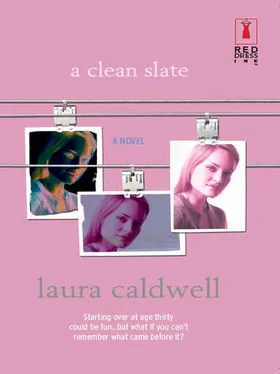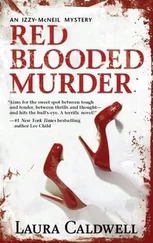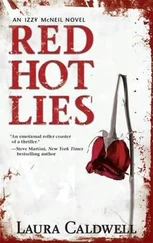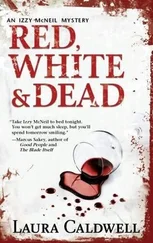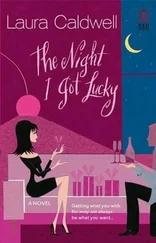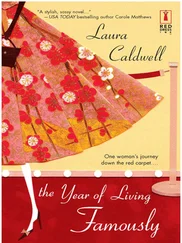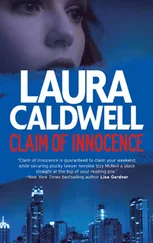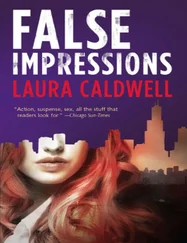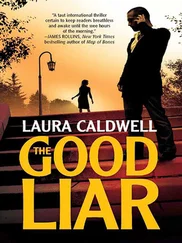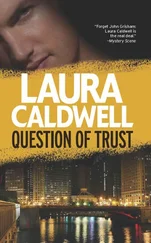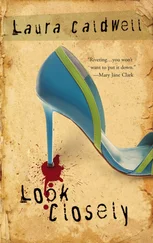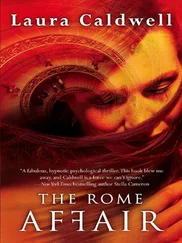A Clean Slate
graduated from University of Iowa, before getting her law degree from Loyola University Chicago School of Law. Laura was a trial lawyer for many years, specializing in medical negligence defense and entertainment law. She is widely published in the legal field, as well as in numerous mainstream publications. Burning the Map, her first novel, was published by Red Dress Ink and chosen by Barnes & Noble.com as one of “The Best of 2002.”
Laura is currently a writer and contributing editor at Lake Magazine, as well as an Adjunct Professor of legal writing at Loyola University Chicago School of Law. Please visit her online at www.lauracaldwell.com.
A Clean Slate
Laura Caldwell

www.millsandboon.co.uk
Before you start reading, why not sign up?
Thank you for downloading this Mills & Boon book. If you want to hear about exclusive discounts, special offers and competitions, sign up to our email newsletter today!
SIGN ME UP!
Or simply visit
signup.millsandboon.co.uk
Mills & Boon emails are completely free to receive and you can unsubscribe at any time via the link in any email we send you.
All my admiration and appreciation to the following people: my stellar editor, Margaret Marbury, Maureen Walters at Curtis Brown, Ltd., everyone at Red Dress Ink (especially Laura Morris, Tania Charzewski, Craig Swinwood, Margie Miller, Maureen Stead and Don Lucey), Beth Kaveny, Suzanne Burchill, Kelly Harden, Ginger Heyman, Trisha Woodson, Ted McNabola, Joan Posch, Rochelle Wasserberger, Hilarie Pozesky, Alisa Speigel, Katie Caldwell Kuhn, Margaret Caldwell, William Caldwell, Karen Billups, Stacey Billups, Kelly Caldwell, Dr. Stuart Rice, Kim Wilkins, Joe Ford, Joel Odish, Anthony Parmalee (photographer extraordinaire) and Greg Brown and Roberto Puig of BMG Model Management.
Lastly, and once again most importantly, thanks, love and overwhelming gratitude to Jason Billups.
“Life isn’t about finding yourself; life is about creating yourself.”
—George Bernard Shaw
Chapter 1
Chapter 2
Chapter 3
Chapter 4
Chapter 5
Chapter 6
Chapter 7
Chapter 8
Chapter 9
Chapter 10
Chapter 11
Chapter 12
Chapter 13
Chapter 14
Chapter 15
Chapter 16
Chapter 17
Chapter 18
Chapter 19
Chapter 20
Chapter 21
Chapter 22
Chapter 23
Chapter 24
Chapter 25
Chapter 26
Chapter 27
Chapter 28
Book Club Questions
Have you ever had a moment when you’ve known—I mean, logically known in your head—that you’re a fantastically lucky person, that you’re truly fortunate to have an education, to live in a nice place in a great city, to have friends who care about you and all that, but you just can’t get yourself to actually feel it?
Well, I was having one of those moments on the day it all started. I stood in the dry cleaners, where the temperature was about a hundred eighty degrees from the pressing and steaming machines.
“Sorry, sorry. No clothes for you,” the tiny Asian woman said as she came back to the cracked linoleum counter for the third time.
I clicked my nails on the counter and expelled a massive breath of hot air, trying to maintain rational thought. “Can you please look one more time? I brought in a whole bag of clothes last week.” I tried not to think of my favorite black pants—my skinny pants—which had been in that bag.
“You have ticket?” The lady waved a pile of pink slips.
“No,” I told her. I never saved those pesky things. Never had to before.
She shrugged. “I look again.” Wiping sweat from her eyebrows, she turned away. As she disappeared into a sea of hanging, plastic-covered clothes, I tried to guess her size. Was it possible that she had stolen my black pants and was wearing them on the weekends?
I felt one of my temper tantrums coming on, but I forced it down. I am lucky to be alive, I told myself as I leaned on the counter, fanning my face. I am lucky because I am now losing weight at an average of a pound a minute. I am lucky because I have a great town house and a nice boyfriend who is soon to be my fiancé, and a decent job and lovely friends. I’ve really got the world by the tail.
The problem was this—I wasn’t buying a word of it. My nice boyfriend soon-to-be-fiancé, Ben, was at my great town house, true, but he wouldn’t be so nice when he learned that his favorite French-blue shirt had been destroyed by the dry cleaners from hell. And the decent job I had—as a research analyst at an investment bank called Bartley Brothers—was starting to look like a ticket straight to nowhere-ville. I’d been toiling for years, digging up information on retail stocks so that my boss could pass on my recommendations and then take all the credit when we made money, or blame me when we lost it. After almost eight years of promises that I would soon be considered for partnership, it still hadn’t happened. Finally, my best friend, Laney, my sanity advisor, was off at some marketing conference (read: company boondoggle) in Palm Beach.
“Sorry,” the dry cleaner said, emerging from the plastic sea, looking even more red-faced and sweaty. “We have nothing for you.” She gave another helpless shrug.
“Can you please keep looking, and I’ll stop back later in the day?”
“Okay, okay.”
I stomped out of the sweltering store, a crisp Chicago breeze hitting me blessedly in the face. As an El train clamored to a halt on the tracks over my head, I trudged up Armitage Avenue, muttering obscenities about my missing clothes and the incompetence of the dry cleaners. The street was full of couples doing Saturday morning errands hand-in-hand, along with the post-college baseball-hat crowd searching for hangover grub.
I took a couple of deep breaths, but they brought no relief from my cranky mood. Ben rarely, if ever, held my hand and did errands with me on the weekends. Saturday mornings were his time to run with his marathon group or train for one of the other races he was constantly entering. It didn’t bother me…not really. Because Ben worshipped at the Church of Holy Workouts he had an amazing body, something that benefited me as well as him. Yes, sex was fine. More than fine, actually. But if I were forced to lodge one complaint about Ben, it would be this—we no longer had any of those couple-y, sappy-eyed rendezvous, such as candlelit dinners or surprise weekends at a log cabin. Romantic interludes just weren’t his thing these days, or at least that’s what he told me, what I told myself to make myself feel better when I saw other couples having picnics in Lincoln Park and horse-drawn carriage rides down Michigan Avenue.
Ben was sweet and funny and wonderful in his own way, though. He would cheer me up by singing show tunes in a falsetto voice, and when it was time to carbo-load for his next race, he’d cook huge pasta dinners for the two of us. And last January when my sister, Dee, died, Ben was amazing—an absolute rock. I couldn’t have gotten through it without him.
At Bissell Street, I took a left and walked along the sidewalk, crunching over a golden bed of fallen leaves, moving past the rusty autumn trees and stone three-flats until I hit the stretch of brick town houses, one of which was mine (something I was inordinately proud of). I’d saved all my paychecks from Bartley Brothers, and this place was the first home I’d ever owned, the place Dee used to love to stay when she came to visit, the place where Ben and I would live when we were married. The sun was peeking through the red curtain of trees, making an X-like pattern on the town homes. Normally, I would have loved to take photos of that—I liked the way the rays made crosshairs on the brick—but I was too annoyed by the dry cleaning debacle to think about getting my Nikon.
Читать дальше
